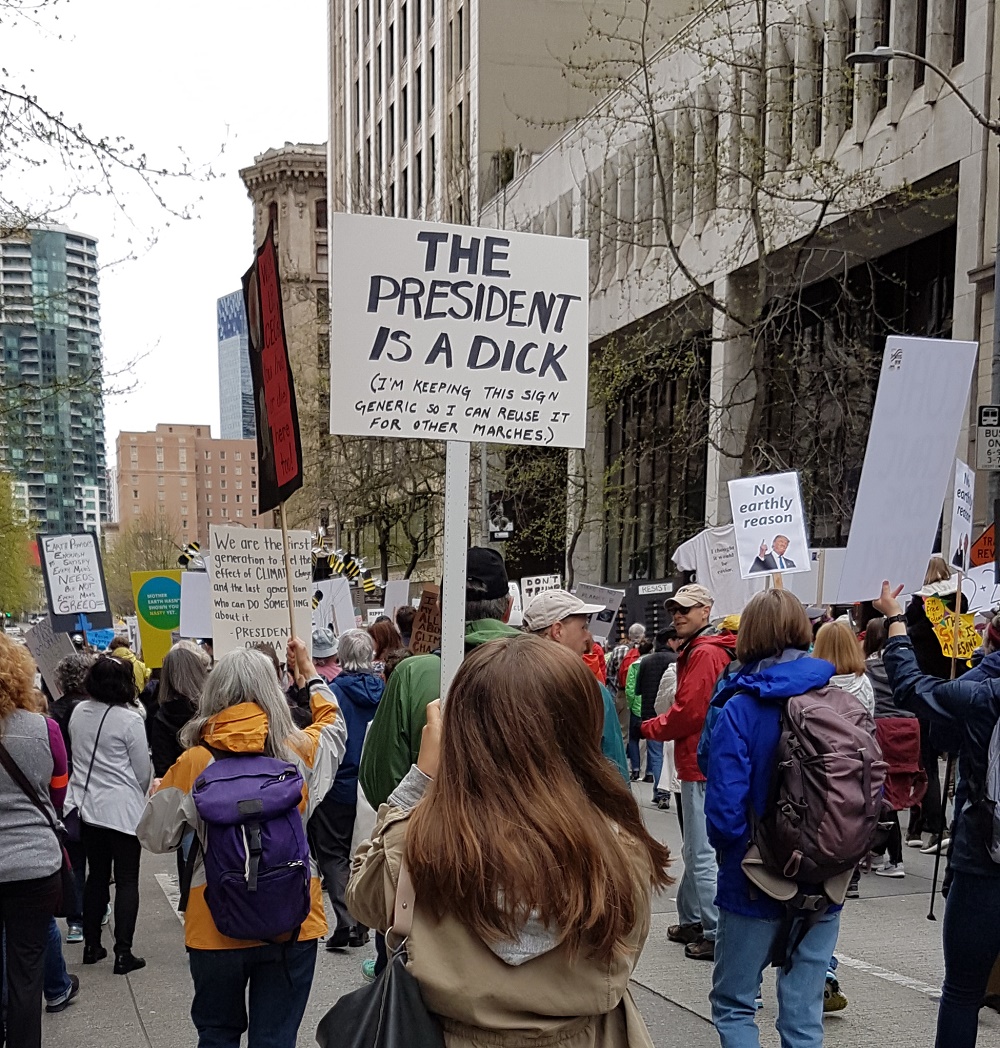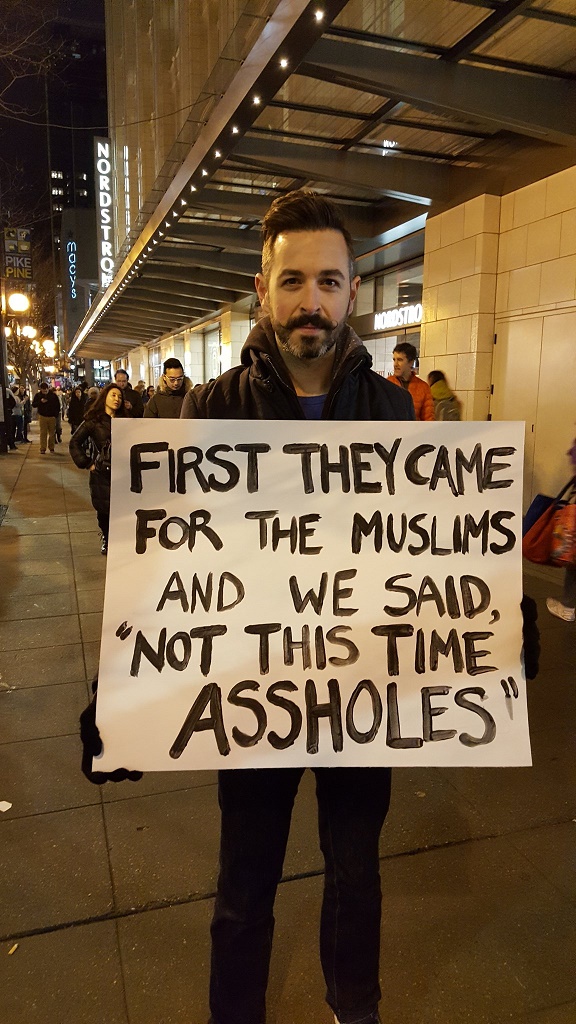How to Explain Trump While Traveling Abroad

Being an American on the road, you often become an ambassador of sorts for your country and culture, and I find myself answering a lot of questions from friends, family, and the occasional well-meaning stranger about the U.S.
And while these questions usually run the gamut from pop to culture (No, I don’t know why peanut butter and jelly is a thing. Yes, our country is very, very large. No, I do not think I sound just like Rachel from Friends when I talk. Also, seriously, you realize that show ended 12 years ago, right? We have other TV shows, thank you very much, England. Many of which we stole from you), in the last few months, nearly every question I get while traveling is focused on one topic: President Trump. While on the road, I am asked on a near-daily basis to explain not only how our reality-star president was elected, but why he is still in office, and why we – the American public – “aren’t doing anything about it.”
For the record, I don’t often talk about politics on the blog. I tend to keep that to Twitter, where the abuse I receive for my opinions is quickly blocked and reported, and I can go about my day (after my blood pressure returns to some semblance of normal and I’ve eaten a cupcake or three). When I write about anything bordering political on the blog, it quickly becomes abusive on a platform which has always exclusively been safe and one that belonged exclusively to me (note: this abuse tends not to be from my usual readers, but from first-time trolls who have stumbled upon this site while presumably looking for something to rage-masturbate to). So I shy away from it here while being unabashedly politically vocal on more public forums. It’s a strange dichotomy.
But today I’m going to talk about how to explain the phenomenon of Trump to people who aren’t American, because it’s a question that keeps coming up for me and for a lot of other travelers. And it’s tricky to answer: a lot of Americans were stunned on election night. I sat in a bar, drunk for the first time in a decade, staring blankly at an enormous screen projecting the impossible results: that a man who bragged about sexually assaulting women was now President. Even seasoned journalists were taken aback – Brian Williams’ sigh embodying what so many people felt at that precise moment.
So for those trying to unlock this mystery from outside the United States, here are a few things to consider:
Hillary was hugely unpopular here in America. In Europe and the rest of the world, this can be rather confusing: she was highly respected and well-known as Secretary of State on the world stage, and incredibly well liked. A poll of the G20 countries found that 18 of them overwhelmingly supported Hillary. Only one – Russia – favored Trump. I spent the days leading up to the election working out of the local Democratic party headquarters, meticulously assembling buttons that read “MADAME PRESIDENT” and working the phone banks – and even so I could feel that there was a palpable dislike for Hillary that we were fighting against. I think that part of this was institutionalized sexism – anyone who tells me otherwise will receive a swift kick to the balls (because, let’s face it: virtually everyone who says it’s not about sexism is a cisgendered dude).
Now, when I say institutionalized sexism, I don’t mean that everyone who disliked Hillary was a sexist (though some, clearly, were). Instead, I mean that she was held to a different and higher standard than Mr. Trump. And she was consistently framed in a negative way – as being an out-of-touch, entitled woman. When Hillary expressed the need for affordable, widespread broadband in rural areas, her quote was cut up and taken out of context – so that it seemed like she was complaining about cell phone coverage in rural areas as a personal inconvenience, rather than a problem she was trying to fix. The media dedicated huge amounts of real estate to negative coverage of Hillary. Which brings me to my next point …
The news had a lot to gain in making the race close. In the U.S., the news is a big, money-making endeavor. Races that aren’t close aren’t interesting – and if fewer people watch the news, that means less ad revenue for those stations. In 2008, Obama decisively won the popular vote by 10 million votes and the electoral college by 192 votes (more on that later) – but coverage made the race seem appallingly close (even though McCain had always been the underdog), and kept viewers glued to their screens. In 2012, the same thing happened with Obama and Romney, even though the president won re-election easily. This election cycle, as Hillary started to pull away from Trump in the polls, negative coverage of her became even more salient – perhaps to give the appearance of a close race. Negative coverage sells more papers – and in this case may have swayed the public, too.
No one thought Trump would win. Seriously. No one. Not the pundits, not Nate Silver (our imperfect oracle), not even Trump himself (and now that he has, there’s a lot of talk around whether he actually wants the job.) So a lot of people who didn’t like Hillary or who weren’t that passionate about her just stayed home. Or people voted third party. Here’s seasoned ABC News commentators laughing at Keith Ellison’s predictions that Trump would soon be leading the Republican party.
The Comey Letter. There’s too much to unpack here in a simple blog post – and that’s part of the problem. Hillary had a private server. She was also hacked (but not on her private server). Misconceptions surrounding this issue fed into the already prevalent view that Hillary was corrupt or untrustworthy. Now, the truth has come out: that there was absolutely no reason to reopen the case, and that the only candidate under investigation during this time was actually Trump. And rather amazingly, both Trump and Pence have had some egregious security issues with their phones and computers (Pence was not only using a private email to discuss governmental issues, but he was actually hacked). But the timing of Comey’s letter was positively damning, and newspapers like The New York Times gave it a disproportional amount of coverage days before the election. The prevailing belief is that it likely cost her the election.
Corporations can donate to elections. This is baffling to a lot of my friends outside of the U.S. – lobbying is well-regulated outside of the United States. But in 2010, by a narrow margin, the Supreme Court upheld Citizens United, which said that corporate spending is equivalent to free speech, and it cannot be restricted. This means that for-profit organizations can give as much money as they want to support political candidates. Now, in this instance, both candidates benefited – and Hillary actually out raised Trump. But Trump said repeatedly said he’s going to do away with a lot of regulations on the coal and oil industry (and has already started doing so). This meant he had the support of powerful lobbies which represented the interests of people in key battleground states like North Carolina. It also means that politicians don’t need to appeal to the masses as much as they do their wealthy donors. Right now repealing Obamacare is drastically unpopular, but the GOP and Trump are pushing for it because it will provide a tax break to the wealthiest 1% of the population. GOP politicians are hoping they can win re-election with enough money, and not by adhering to what their constituents want.
Millions more people voted for Hillary than Trump. This becomes really confusing for a lot of people in countries where a simple majority will win you the election. In the United States, the presidency is determined by who gets more votes in the Electoral College, which is an antiquated system rooted in slavery. No, for real. See, back in the day, southern states had a large population of people (mostly slaves), but only a few people (white men) who could actually vote. Under a popular vote model, northern states would always win the election. The Electoral College, though, counted slaves as 3/5ths of a person (yes, yes it is fucked up) – so the more slaves you had, the more Electoral College votes you had. For states like Virginia, this is a big deal – if you won the state, you won all of its EC votes – and it had a ton. This is why so many of our early presidents were from Virginia. So the EC mitigates the votes of larger states, and overemphasizes the votes of smaller states. Because smaller states tend to go Republican, this creates some interesting electoral results.
Why do we still have the Electoral College, then? It’s something that a few states are reconsidering, but so far it hasn’t gotten a lot of traction. It’s very difficult to change U.S. institutions. Even our Constitution is 200 years old and it’s hard to update this stuff. Plus, people are worried that smaller states will not have their interests reflected in a national election.
Only 26% of eligible voters actually voted for Trump. He’s very much a fringe candidate. But his supporters were in the right states (see Electoral College, above). Trump ran as an outsider – but because he doesn’t have any experience in the political realm, he’s basically capitulated to what the GOP has wanted after getting elected. The GOP wants to destroy Obamacare (because, see above – it would mean tax breaks for their donors), which is something Trump specifically campaigned against. So what you have right now is an incompetent President going along with the doctrine of the Republican party – which was not even something the people who voted for Trump were in favor of.
(Source)
Why are the American people letting the government ban Muslims, take away healthcare, remove environmental restrictions, and cut funding to hundreds of organizations that benefit the public? Oof. I get this question all the time, and it’s a doozy, because here’s the thing: we aren’t. But there isn’t much that you can do after an election has taken place. The biggest checks to a president are Congress and Senate. Right now, Republicans control both of those – and they are all for the President’s plans. When the vote to repeal Obamacare came before Congress, not a single Democrat voted for it – but every single Republican congressperson (with the exception of 4) did. When Trump signed a ban on Muslims, it was an executive order – so it wasn’t even up to a vote. It was just sort of decreed. The only check on it was from the U.S. Attorney General – who, at the time, was Sally Yates. Trump immediately removed her from office and appointed Jeff Sessions. Sessions has a history of voter suppression and racism – he is not a check on the President’s racist decrees. Under Sessions, the DOJ claimed that precedent for the Muslim ban was a court case defending segregation of pools in the 1970s. So now the only way to stop Trump’s Muslim ban is from the lower courts – and they’ve been suing him, because that’s the only check on him that remains, and the case will likely end up going to the Supreme Court. Unfortunately, the GOP (who again, controls everything) managed to make sure that Scalia’s vacant seat, which should have gone to Merrick Garland, went to Neil Gorsuch – who is staunchly conservative and may tip a judgement made by the court in Trump’s favor.
Okay, but can’t you like, rebel? What about sanctuary cities? A lot of Trump’s more hateful orders – like his racist crackdown on immigrants who are working in the U.S. illegally – need to be enforced on a local level, so it stands to reason that cities (which tend to be far less conservative than rural areas and are also hubs for immigrants) could simply refuse to enact Trump’s orders. And indeed, many, including my own beloved Seattle have done just that by declaring themselves “sanctuary cities.” But that resistance is already getting stomped down. And both Attorney General Sessions and President Trump have threatened to withhold federal funds from sanctuary cities. The governor of Texas just banned them in his state – threatening fines of up to $25,ooo a day to governmental entities that refuse to comply.
Why can’t you impeach him? Again, only Congress can do that. And there’s tons of grounds for why they could. The emoluments clause, for one (Trump never divested his private holdings, which supposedly he needed to do before taking office). But Congress is controlled by the GOP and Trump is doing their bidding, so they clearly aren’t going to vote to impeach. They’ll only get rid of him when he proves to be useless (there is a very clear scenario where they make him the scapegoat for all the unpopular legislation they’ve passed, and then get rid of him).
Plus, impeachment wouldn’t actually be great for us. See, Trump’s incompetent, but he wants the people to like him, and he might actually do the right thing in hopes that they will. But Pence – who would take office if Trump is impeached – is an incredibly dangerous human being. He caused an outbreak of HIV when he was governor of Indiana (he claimed that needle exchanges promoted drug use. They don’t.) and his stance on LGBTQ rights is abhorrent. Already a bubble has formed around the Vice-President, in an attempt to shield him from any wrong-doing on the whole Russia issue, so we can rest assured if Trump gets the boot, we’ll have to deal with President Pence.
Okay, how did the GOP get control of everything? This is crazy. The problem is that demographically, Democrats don’t vote in mid-term elections. Over the years, this meant that Republicans slowly took over more and more seats in the House and Senate. But wait – it gets worse. The second they gained control, Republicans set out to redistrict a lot of areas, ensuring that they would always have a majority of seats in state legislatures even if they were getting fewer votes than Democrats on a statewide level. In Michigan, for example, Republicans received 30,000 fewer votes that Democrats, but they hold 63 seats in the House of Representatives, as opposed to 47 for Democrats. But redistricting doesn’t fully explain the problem. There’s also been massive voter suppression efforts throughout America (in areas that have historically voted for Democrats). In Wisconsin, new voter ID laws meant that 200,000 people were unable to vote this election. Trump won the state by 22,000 votes. And statistically, minority voters have to wait twice as long to vote as white voters. In Georgia, Karen Handel, a Republican who is running in a special election against Democrat Jon Ossoff was enraged to learn that voter registration had been extended – meaning more people would vote in her race. She described it as Democrats trying to steal the election.
So, this will get fixed in the next election, right? Maybe. Maybe not. The next midterm election is 2018. Republicans control everything until then. And even if the next election happens, the voter suppression and gerrymandering efforts mean that it doesn’t matter if Democrats turn out in greater numbers (because that’s what they’re doing in a lot of states now, and it doesn’t matter).
Aren’t you mad? Every day is a constant state of panic, grief, and disbelief. This is why my Twitter feed is a never-ending series of attempts to channel my rage into 140 characters. But here’s the thing: the world is moving in the right direction. The U.S. elected Trump, but since then 6 European elections have had Nationalists underperform compared to the polls. So I suppose I’m cautiously optimistic. (I’m also privileged as f*ck, and live in a city where more than 90% of the population voted for Hillary – which helps on the optimism front.)
Can’t you all, like … take to the streets or something? We have and we are. But it doesn’t seem to be working – GOP representatives are avoiding their Town Hall meetings, and as I mentioned before, repealing Obamacare was drastically unpopular but the GOP still axed it. There are also bills proposed in five states to criminalize peaceful protest, but I don’t think those will come to fruition.

Rand at one of several marches we’ve been to this year.
Wait, so … is it safe for me, as a foreigner, to come to the U.S.? Rand and I had a long talk about this and the conclusion we came to is … we have no idea. On Election Day, someone spat on him for wearing a t-shirt that said “FEMINIST”, and he’s seen an increase in anti-Semitic comments and threats in his Twitter feed and elsewhere (I’ve seen a couple, too). There have been a rise of anti-Semitic attacks, as well as numerous attacks on women wearing hijabs – but keep in mind this is mostly happening to Americans. There is a rise of White Nationalist (neo-Nazi) groups in America right now, so that’s something to be concerned about, too. The ACLU has also listed travel advisories for people heading to Texas and Arizona, based on treatment of immigrants and people of color. Trump’s travel ban has been stricken down (at least temporarily) but it’s safe to assume that if you are from one of the Muslim countries on the list (which also align to countries where Trump does not have hotels, incidentally) you may have trouble at border control. Oh, and apparently a lot of border control agents are asking people to unlock their phones so they can search through them (illegally). So … I’m sorry. I just don’t know. Do what you need to do to make yourself comfortable.
If you are looking for further reading about the political climate that gave birth to a Trump Presidency, Ta-Nehisi Coates’ piece for The Atlantic, “My President was Black” is excellent. The New Yorker‘s John Cassidy also took at look at the election in its immediate aftermath.








